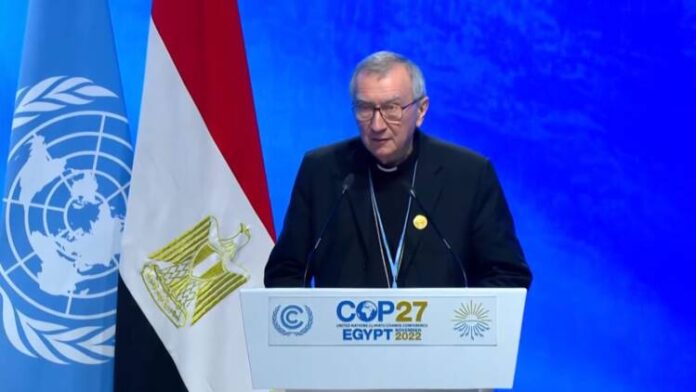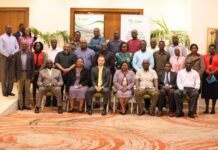The Church has added its voice to climate change resolution and urges developed countries to devise a compensation mechanism for Africa to cover for the loss and damage incurred, fueling concern for far-reaching food crisis and other calamities spurred by climate change.
The church in their deliberations emphasized the moral duty of richer nations who are responsible for the climate crisis to establish a compensation mechanism for the vulnerable nations and youths.
“The climate crisis is fundamentally an issue of justice and peace. There can be no peace if polluters continue to profit from climate destruction whilst the people suffer, and there can be no justice without promotion of peace-led solutions to climate change”, said Ben Wilson, Partner Advocacy Officer the Scottish Catholic International Aid Fund (SCIAF) and member of the African Climate Dialogues Steering Committee.
COP27, they contend must agree to a package of action which gets finance to people who urgently need it on the frontlines of this emergency.
Meeting jointly on the sidelines of the conference running from November 6-18 in Sharma Sheik, the senior church leaders and Catholic Organisations pray and discern practical actions to advocate for climate justice change.
The church envisages that the COP 27, being held on African soil, will deliberate on loss and damage caused to the continent and ultimately deliver tangible action plans to rapidly reduce greenhouse gas emissions, promote resilience.
These will in turn provide funding to developing countries for both climate adaptation and loss and damage already occurring as a result of climate change, the Vatican News, a Catholic publication cites the leaders as advocating.
Interest groups and the Africa Group of Negotiators are lobbying for serious considerations to see reduced greenhouse gas emissions by developed nations.
The summit is taking place against a backdrop of extreme weather events worldwide, an energy crisis propelled by the war in Ukraine, and scientific data reiterating that the world is not doing enough to tackle carbon emissions and protect the future of our planet.
Cardinal Ambongo of Kinshasa, the Vice-President of the Symposium of Episcopal Conferences of Africa and Madagascar (SECAM) and President of its Justice, Peace and Development Commission, noted that: sustained emissions have devastated the continent and a compensation for damage and loss was inevitable.
He adds: “Climate change is a lived reality for millions of people across Africa” Cardinal Ambongo stressed that ”A deal at COP27 must include finance for Loss & Damage, which is compensation for countries who are already suffering from climate impacts but are not responsible for causing it”.
Musamba Mubanga, Senior Advocacy Officer at Caritas Internationalis, supports the argument and that the desires to replace the losses and damage incurred by Africa and indicated:
“Caritas members across the world are already seeing the devastating impact that the climate crisis is having on access to food in already hungry parts of the world”.
COP27, they further contend must agree to a package of action which gets finance to people who urgently need it on the frontlines of this emergency”.
David Munene, Programme Manager at the Catholic Youth Network on Environmental Sustainability in Africa (CYNESA) called for the need to embrace the young people in the decision-making process on this crucial issue.
”Young people especially in Africa are being hit hardest by the detrimental effects of Loss and Damage, yet they are not responsible for their stolen future”, he said.
The participants at the summit further discussed among other topics, climate finance, food security, forced migration, and the contentious “Loss and Damage” issue, an issue advocated over the years by faith-based organizations and was added at the last moment on the agenda of negotiators for the first time since the adoption of the United Nations Framework Convention on Climate Change (UNFCCC), in 1992.
And the clergy further reflected on the process of the African Climate Dialogues, an initiative that brought together Church and civil society actors and partners, including communities and religious leaders from across the African continent and European organisations to share African realities of the climate crisis.
These dialogues had resulted in a communiqué that includes key messages gathered throughout the five sessions that took place between July and September of this year.
Earlier, dozens of religious leaders from around the world had gathered simultaneously in London, Sharm el – Sheikh, Jerusalem and other locations around the world to hold a ground breaking ‘Climate Repentance Ceremony’.
The leaders walked together, in a prayerful, penitential march with scrolls bearing the Ten Principles for Climate Repentance
For the first time, a Climate Repentance Ceremony, calling for people to repent and change people’s destructive lifestyles and systems in order to save the planet.
Ecumenical Patriarch Bartholomew, also known as the Green Patriarch, had issued a statement ahead of the climate repentance ceremony saying: “The abuse of nature and the exploitation of its resources are a sin against God the Creator and the gift of creation”.









